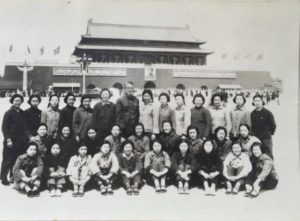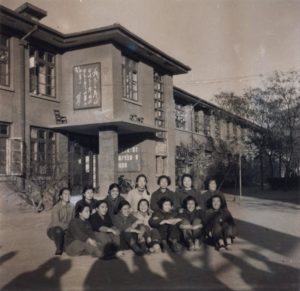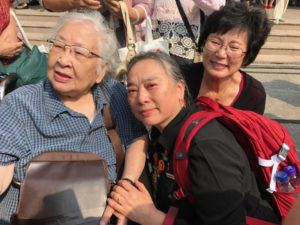Special Guest Blog Post, Written by Jeff Kelley upon Hung Liu’s return to China for the 100th anniversary of her high school.
100th Anniversary
Experimental High School Attached to Beijing Normal University
(formerly Girls Middle School Attached to Peking Normal University)
北京师范大学附属实验中学 (北京师范大学附属女子中学)
September 2, 2017, by Jeff Kelley

Hung Liu, second row, third from left, circa 1965
Hung Liu has always cherished her experiences as a student at the “Girls Middle School Attached to Beijing Normal University.” (The Chinese are famous for clunky bureaucratic names.) A girls’ boarding school so elite that even Mao‘s daughters went there, the campus was/is about a mile west of the Forbidden City (Mao’s daughters were picked up and dropped off everyday). Hung has often talked with fondness about dorm life, camaraderie among the girls, the passion of teachers, and of the sense that the Experimental High School was a gateway to a modern China as well as to the nation’s classical, ancient past.

Hung Liu visiting the Great Wall
Hung loved her teachers, especially Mrs. Xia Xiurong, who taught Chinese literature. Earning excellent grades, she also loved the process of learning.

Hung Liu, back row, center-left
This sense of enthusiasm, however, was shattered in 1966 with the beginning of the Cultural Revolution. It was in Hung’s own school that teenaged Red Guards first rebelled, replacing subjects like history, literature, the arts, and even the sciences with the practice of revolution. Mao appealed to the youth of China to destroy anything (and anyone) corrupted by capitalism or tradition, and they did so with the zealous self-righteousness of impassioned teenagers. In August, 1966, campus Red Guard leader Song Binbin lead fellow students in the beating of the school’s Principal, Bian Zhongyun, to death.

Principal Bian
Bian was the first teacher killed in the Cultural Revolution, and her slaying led to further killings of educators throughout China by the Red Guards. Hung was not at school that day, and, because of her family history (and personal disposition), she was neither a Party member nor a Red Guard, but she was shocked that so many of her classmates – girls receiving the best education in Beijing – could turn so quickly from a class of elite students to a mob of violent revolutionaries.

Binbin with Mao
Two weeks later, Song Binbin became famous throughout China when she was photographed pinning a red armband on Mao in front of one million people in Tiananmen Square. In 2014, Song Binbin, who earned a doctorate at MIT, apologized publicly for her role in killing Bian Zhongyun, describing her shame at having “not protected” the school’s teachers as a source of “life long regret.” She also returned for the 100th anniversary.

Song Binbin’s apology
Hung recalls that between 1966 and 1968 no classes were offered – they practiced revolution instead. In 1968, she was sent, as were so many others, to the countryside to undergo “proletarian re-education” as a peasant farmer, not returning to Beijing until 1972. During the 70s, she studied to become an art teacher at Beijing Normal University. For the next several years she taught art to middle school students. In 1979 she was admitted to the Central Academy of Fine Arts in Beijing – the nation’s best art academy. Finally, Hung came to the US where she studied at UCSD. Still, one gets the sense that her enthusiasm for learning – her love of art, literature, and the sciences (she wanted to become a doctor before the Cultural Revolution) – was kindled in high school, and that she cherished her experience there, despite the murder of Principal Bian.

Hung Liu, sitting, second from left, at the Experimental High School, circa 1964

At the reunion…
On September 3rd, this year, Hung returned to Beijing for the 100th Anniversary of the founding of the Experimental High School. Thus, nearly 50 years after she and her classmates were sent to the Chinese countryside, they came together again to celebrate the centennial of their school. Perhaps most movingly, their literature teacher, Mrs. Xia Xiurong, now in her 90s, attended the reunion. Her students were overcome with emotion at seeing her, especially Hung. Mrs. Xia told Hung (true story) that she had been her best student, whose written compositions were always memorable. Sometimes in life the yawning gap between the past and present collapses like an accordion, so that, as in this case, student and teacher are back together, if only for a moment. Despite the violence and madness of the late 60s in China, Hung and her classmates were able to re-wire history in terms of their solidarity as a generation, their love of learning, and the selflessness and sacrifice of their teachers. Perhaps they are comforted by the knowledge that history – so coveted by the zealots of a revolutionary era – now belongs to the (once) young women who cherished learning over ideology.

A tearful moment with literature teacher Xia Xiurong
